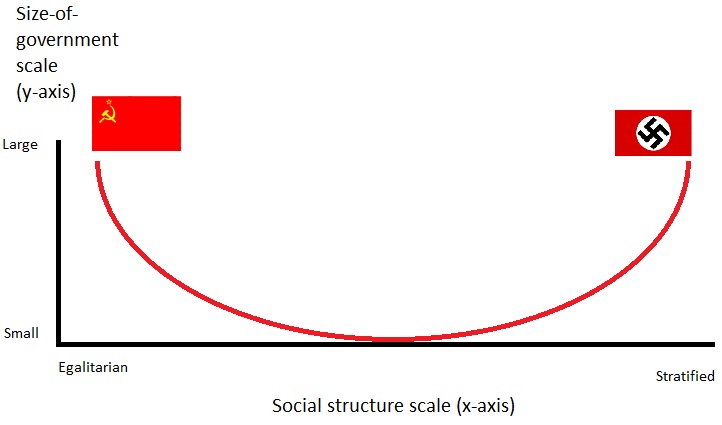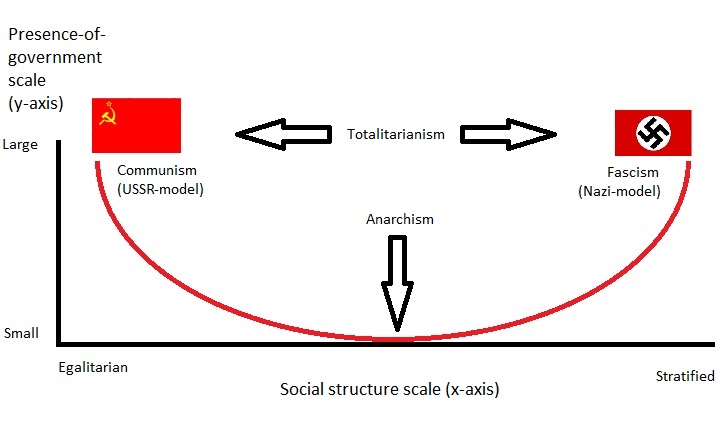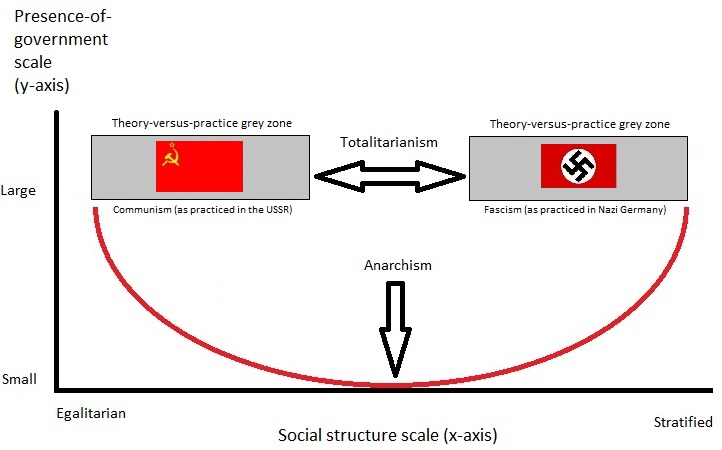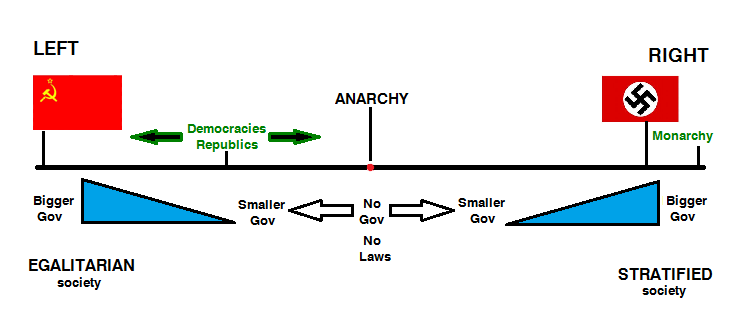I plan on visiting Fredericksburg this year.
National Socialism being 'Right Wing'
-
Anyway, as far as left-right spectrums go, if you want to define right as less government and left as more-government, then I suppose it’s fair enough to put anarchism on the right. The basic problem is that the above way of defining left/right seems ahistorical (given that originally, the ‘right’ was associated with hierarchy, authority, traditional government etc) and thus introduces more confusion than clarity.
-
Anyway, as far as left-right spectrums go, if you want to define right as less government and left as more-government, then I suppose it’s fair enough to put anarchism on the right. The basic problem is that the above way of defining left/right seems ahistorical (given that originally, the ‘right’ was associated with hierarchy, authority, traditional government etc) and thus introduces more confusion than clarity.
Understood, and I do agree. Which, again, is why I tried to come up with some combination of the two which tries to reconcile the differences:
This is imperfect, but better than a simple L-R scale.
-
This is imperfect, but better than a simple L-R scale.
The two blue triangles at the bottom of your chart are making me wonder if perhaps an inverted bell curve would be a good way of describing the continuum – something like this for example:

-
Anyway, as far as left-right spectrums go, if you want to define right as less government and left as more-government, then I suppose it’s fair enough to put anarchism on the right.Â
And just to follow up on that point: on the new chart I’ve just posted, anarchism would be at the bottom of the chart rather than on the left or the right, with a value of y=0. The top of the chart could be given a value of, let’s say, y=100, with the USSR and Nazi Germany both sharing the same high y-axis score. If anarchism (basically, the absence of government) is the term corresponding to value of y=0, I imagine that the opposite concept (the omnipresence and omnipotence of government) could be labeled totalitarianism and that it would apply to all scores of y=100, regardless of where they fit on the x-axis.
-
@CWO:
Anyway, as far as left-right spectrums go, if you want to define right as less government and left as more-government, then I suppose it’s fair enough to put anarchism on the right.�
And just to follow up on that point: on the new chart I’ve just posted, anarchism would be at the bottom of the chart rather than on the left or the right, with a value of y=0. The top of the chart could be given a value of, let’s say, y=100, with the USSR and Nazi Germany both sharing the same high y-axis score. If anarchism (basically, the absence of government) is the term corresponding to value of y=0, I imagine that the opposite concept (the omnipresence and omnipotence of government) could be labeled totalitarianism and that it would apply to all scores of y=100, regardless of where they fit on the x-axis.
Yes, I do very much like this interpretation. While searching for similar scales and images, I found a 3-D representation that used a funnel as a model. The Totalitarian government structure was at some point near the edge of the circle on the top and anarchy was at the bottom of the funnel portion in the middle. Anyway, that reminded me of your curve.
-
Yes, I do very much like this interpretation. While searching for similar scales and images, I found a 3-D representation that used a funnel as a model. The Totalitarian government structure was at some point near the edge of the circle on the top and anarchy was at the bottom of the funnel portion in the middle. Anyway, that reminded me of your curve.
Glad you like it. I’ve added some new elements to the chart to reflect those points; see the new version below. I’ve also modified the label of the y-axis to replace “size” with “presence”. It occured to me that the issue isn’t really government size in a purely quantitative sense (since, for example, the government of a very large democratic country might well be larger than the government of a very small totalitarian one); the issue is really the extent to which the government is “omnipresent and omnipotent” – meaning the extent to which the state has power and control over its citizens. I used “presence of government” as a short way of expressing this, but there might be a better word than “presence”.

-
“Presence” is good. Most people (who know what they are talking about) know that size equates to magnitude of presence. However, to allay confusion I think “presence” is the best word choice.
-
I’ve made a couple more tweaks to the chart. I’ve clarified that communism and fascism are broad terms, and that the USSR and Nazi Germany were country-specific applications of these political philosophies. I’ve so added grey zones to try to convey the point that contraditions were found in both countries, as has been discussed in earlier posts. My impression is that the contraditions were mainly on the x-axis, so I’ve made the grey zones wider than their height.

-
This is not a political thread.
It is a question as to why it is taught that the far right of the political spectrum are the Nazis, and the far left is the old U.S.S.R. The Nazis and the Soviets were pretty much the same animal, the government makes or brakes you - go against us and we will crush you. The far right to me would be capitalism taken to the extreme (which we have seen in our history). Having children work 30 hours a week. Horrid workplaces. Low pay. Etc. etc.
I fail to see how the Nazis were “Extreme Right Wing”, and the Soviets being “Extreme Left Wing”. They were both the same animal, the government running your life.
I am aware that in the 20s and 30s the Communist and Nazis fought each other for control over Germany. But to me that is like the ‘Bloods’ and the ‘Crips’ fighting. There is no ideology, they just want their gang to win.
My ultimate question is what constitutes Nazis being extreme right wing, and the Soviets being extreme left wing? I guess it is a political question after all, but I want to keep it to the WW2 era.
The Nazis and the Soviets were pretty much the same animal
That depends on the spectrum you’re observing. Certainly, both groups favored a big government, with few constraints on its power, and harsh penalties directed against those who opposed the government. But the envisioned role of government was different for the two groups.
Communists believed in creating equality by cutting people down to size. Sometimes literally. So for example, the kulaks (middle class farmers) had to be wiped out, because they were considered too economically successful.
Unlike the communists, the Nazis did not regard economic equality as some holy grail. Certainly, they wanted to reduce economic disparities between the richest and poorest Germans. Their way of achieving that was to increase the wages of German workers, while providing German workers with heavily subsidized travel opportunities.
Another difference–which has already been pointed out–is that the Nazis were nationalistic in outlook. The communists believed in an eventual one world Marxist government, which for them would result in utopia.
A third difference is outlook about race. The Nazis of course wanted to preserve their own race and their own ethnicity. Even to expand it into Eastern Europe. A number of Marxist theorists concluded that the existence of race was a barrier to the one world revolution for which they hoped. Once the existence of race had been eliminated through miscegenation, the workers of the world would be one step closer to uniting in the hoped-for Marxist revolution. At least, that was the thinking; and that’s why Marxist movements in Western democratic nations have typically promoted policies and social attitudes intended to eventually eliminate the existence of race.
A fourth difference the two groups’ position on the nature versus nurture debate. Marxists seek to create utopia by fundamentally changing human nature. They are viscerally, violently opposed to eugenics; which they associate with Nazism. In order for them to believe in their utopia while opposing eugenics, it was necessary for them to believe that human differences are caused primarily by environmental factors. Change the environment enough, and you can fundamentally change the person. Under Stalin, any Soviet scientist who supported the modern theory of genetics could expect to be shot in the back of the head or sent to a gulag.
Unlike the communists, the Nazis accepted the (scientifically accurate) belief that differences between individuals are caused primarily by differences in genetics. They also added beliefs not supported by science–beliefs motivated by the racial portion of their ideology.
The Nazis wanted to achieve something recognizably German. They celebrated the German language, German culture, German heroes. They envisioned a future in which Europe would contain an increasingly large proportion of blonde haired, blue eyed individuals.
The communist movement was actively hostile to each and every one of those goals. They had their own racial agenda, as important to them as the above agenda was to the Nazis. In the future they envisioned, the people of Europe and the rest of the world would be of mixed race. All local cultures–including Germany’s–would be destroyed; replaced by something created by the united workers of the world. True belief in Marxism requires one to discard traditional notions of fighting for one’s own people, nation, or culture; and to join a movement actively working to eradicate those things. Joining such a movement would be considered treason, at least from a right wing perspective.
-
To be simple… Look at politics as a square.
-
The top side of the square is 100% government control and authority. The bottom being 0%
-
The left hand side of the square is essentially 100% tax. The right being 0%.
Depending on policy, different groups find themselves at different coordinates in the square.
To answer the original posters question - Communists and Fascists essentially exert the same amount of authority. But differ in their economic policies. IE one could be rich in Nazi Germany, where as in communism, the economic freedoms were not as available. That is one of several conclusions that leads people to see the Nazi’s as right wing.
In simpler terms it’s “Government control of business (Left) vs Business control of Government (Right).”
But is that enough to make the NSDAP a right wing party? In my opinion no. As I feel that all big government is essentially “Left Leaning/Socialistic”. Meaning that 3/4 of the square is socialism (Anything with more than 50% authority, or 50% tax control of your life)
Again, a very rudimentary and simple perspective, take it or leave it.
-







